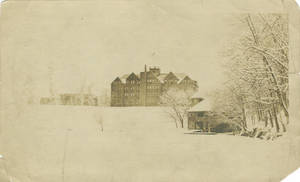Dormitory Building and Boathouse in Winter
Item Information
- Title:
- Dormitory Building and Boathouse in Winter
- Description:
-
A photograph of Springfield College's first dormitory building, known today as the Administration Building and the Gladden Boathouse taken from the perspective of Massasoit Lake. Also visible in this winter snow scene is Marsh Memorial Library to the left of the Dormitory Building.
- Date:
-
[1913?–1930?]
- Format:
-
Photographs
- Location:
- Springfield College Archives and Special Collections
- Collection (local):
-
College Archives Digital Collections
- Series:
- Administration Building Records
- Subjects:
-
Administration Building
International Young Men's Christian Association College
Marsh Memorial
Springfield College
Springfield College--Buildings
Gladden Boathouse
Lake Massasoit
Springfield (Mass.)
Winter
Snow
Dormitories
Lakes & ponds
Universities & colleges
- Places:
-
Massachusetts > Hampden (county) > Springfield
- Link to Item:
- https://cdm16122.contentdm.oclc.org/cdm/ref/collection/p15370coll2/id/1127
- Terms of Use:
-
Text and images are owned, held, or licensed by Springfield College and are available for personal, non-commercial, and educational use, provided that ownership is properly cited. A credit line is required and should read: Courtesy of Springfield College, Babson Library, Archives and Special Collections. Any commercial use without written permission from Springfield College is strictly prohibited. Other individuals or entities other than, and in addition to, Springfield College may also own copyrights and other propriety rights. The publishing, exhibiting, or broadcasting party assumes all responsibility for clearing reproduction rights and for any infringement of United States copyright law.
Contact host institution for more information.
- Publisher:
-
Springfield College
- Notes:
-
The Administration Building was originally constructed as the college’s first dormitory and also housed classrooms, offices, and the school’s first dining facility. Construction began on the dormitory the last week in April of 1895 and the corner stone of the building was laid on Friday, May 10th, 1895 with President Charles H. Barrows officiating. The dedication took place on June 17th, 1896, at which, President Barrows introduced the college’s fourth President, Laurence L. Doggett. Consummating the transfer to the new campus, the completion of the new dormitory in January 1896 was a milestone in Springfield College history. With the erection of the first building, the East gymnasium (1894), and the new dormitory, Springfield College began to lay permanent roots on the land along Lake Massasoit. During World War II, when the campus became a center of Army Training and the Naval Convalescent Hospital, the old dormitory was deemed a fire hazard and its top floors were removed. The resulting two-story building eventually became the Administration Building.
- Identifier:
-
rg113-01-06-001
DL-013




